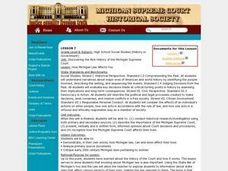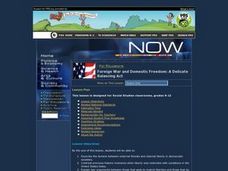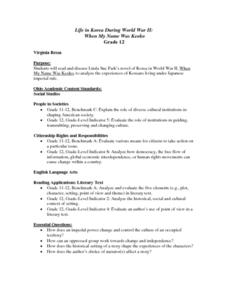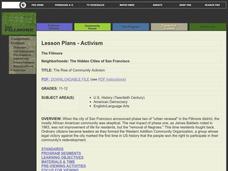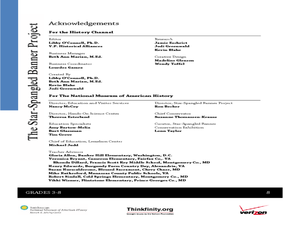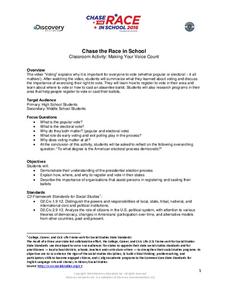Curated OER
How Michigan Law Affects You
Students examine how the laws in Michigan affect their lives. They use primary source documents to analyze the state's history. They discuss laws pertaining to women as well.
Curated OER
The First (and Last) Words
What does "freedom of speech" mean to your class, especially in the context of Internet communications? In round-table discussion format, middle and high schoolers address the issues discussed in "State Legislatures Across U.S. Plan to...
Curated OER
The Embodied Presidency
Tenth graders compare and contrast the immigration reform policies of Presidents Reagan and Bush. For this immigration lesson, 10th graders examine primary documents related to each president's policy for immigration reform. Students...
Curated OER
"In God We Trust": The Camden Man Who Put the Missing Motto on the Dollar Bill
Here is a fascintating lesson which relates how the motto "In God We Trust" came to appear on all US currency. It turns out that a man from Arkansas came up with the idea and petioned his congressman and President Eisenhower himself to...
John F. Kennedy Presidential Library & Museum
Ask Not What Your Country Can Do for You
Ask not what the lesson here can do for you, but what you can do with the lesson. The answer is quite a lot! Young scholars revisit JFK's famous inaugural address with a focus on his plea for civic engagement. There's a...
Alabama Department of Archives and History
Alabama's 1901 Constitution
"We, the People of the State of Alabama. . ." Did you know that the Alabama State Constitution has 357,157 words while the US Constitution has only 4,400? And that it has 798 amendments while the US Constitution has...
Curated OER
Good Citizens
Students consider what qualities and values make a good citizen. Students compare the requirements to become a U.S. citizen in 1896 to current requirements. Students create a country and write out the qualities a good citizen would possess.
Curated OER
What Does It Mean To Be a Good Citizen?
Students study citizenship and what it means to be a good sitizen. They create their own country and determine its citizenship rules. They work together to create a visual representation of what makes a good citizen.
Curated OER
The ABCs of Citizenship
For this lesson, learners read the book that focuses on the ascpects of citizenship/ Students imagine a scene in which each statement is actually happening. Learners descirbe rights, repsonisbilities. Assess students by asking what is...
Curated OER
Who Are Our Greatest Presidents?
Young scholars create criteria to evaluate U.S. Presidents. In this presidential legacy lesson, students determine criteria to rank presidents. Young scholars research the presidents, then evaluate the current president and assess how...
Curated OER
Foreign War and Domestic Freedom: A Delicate Balancing Act
Students investigate civil liberties in the U.S. They watch and discuss a PowerPoint presentation, conduct research on an event from a timeline, complete a worksheet, take an ideology quiz, and conduct a debate.
Curated OER
A Right to Bear Arms - One Patriot's View
Students research Samuel Adams' role in the crafting of the Second Amendment. They consider how Adams' views evolved with time and write a one-page response linking their research to current events.
Curated OER
Life in Korea During World War II: When My Name Was Keoko
Twelfth graders review facts about roles of Asia and Japan in World War II, read When My Name Was Keoko to familiarize themselves with daily life and historic events during World War II in Korea, and participate in student-led...
Curated OER
The Rise of Community Activism
Young scholars examine the rise of citizen leaders and community organizing.
Curated OER
The Decision to Americanize the War in Vietnam
Students research the major events of the Vietnam War and construct a timeline. They do the same with the presidency of Lyndon B. Johnson or the 1960's. They act as an advisor to President Johnson to recommend a course of action...
Curated OER
A History of the War of 1812 and The Star-Spangled Banner
Students examine the causes and outcomes of the War of 1812, and determine the chronology of the Star-Spangled Banner. In this War of 1812 instructional activity, students learn vocabulary and read a narrative about the War of 1812...
Curated OER
Is the Internet Igniting Violence?
Students explain how various issues regarding restrictions on the Internet are impacted by the First Amendment of the United States Constitution, particularly in light of the recent school shooting and bombing in Littleton, Colorado.
Curated OER
McMUN Model United Nations
If you have been searching for a plan to run a model U.N. simulation, this plan provides some bare bones for your lesson. Scholars break into blocs to research and discuss global issues and come up with collaborative solutions. In their...
PBS
Journalism in War Time: What Does the Public Need to Know?
A viewing of the documentary War Feels Like War, launches an exploration of the importance of accurate and comprehensive war reporting. Groups investigate various news agencies and assess the factors that influence their stories. A...
Facing History and Ourselves
The Audacity of a Vote: Susan B. Anthony’s Arrest
Susan B. Anthony's speech "Is It a Crime for Women to Vote?" takes center stage in a lesson that asks class members to consider how they might respond to what they consider an unjust law. Groups work through the speech paragraph by...
National Endowment for the Humanities
Ratifying the Constitution
Ratifying the Constitution was no simple task. Using primary sources, such as classic writings from the Federalists and Anti-Federalists, young scholars examine the arguments for and against the Constitution. They then decide: Would they...
Constitutional Rights Foundation
Educating About Immigration The DREAM Act
Group members role play state legislators, supporters of and opponents to the The DREAM Act (Development, Relief, and Education for Alien Minors). After listening to the arguments put forth for and against the immigration...
Discovery Education
Making Your Voice Count
As learners watch a video on voting, they take notes on a worksheet that lists various voting topics, including electoral and popular votes, early voting, and exit polling. Then, young people research the Internet for their state's...
Curated OER
The Federalist Debates: Balancing Power Between State and Federal Governments
Middle schoolers examine the pros and cons of state sovereignty vs. federalism, as argued by the Founding Fathers. They identify the basic positions of each side, complete a worksheet, and write a persuasive essay arguing for Jefferson...


